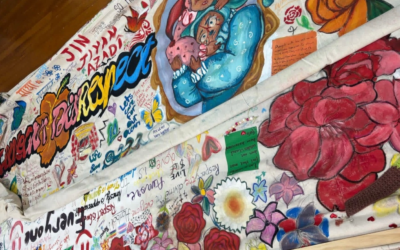On May 24th, at the Sydney Writer’s Festival, a panel titled “The Secret Lives of Women” featured three cross cultural novelists. This panel discussed the inner worlds of their characters, where aspirations that are obscured by duty and expectations of the world. The three novelists were Elizabeth Acevedo, a Dominican American author of Family Lore, Balli Kaur Jaswal, a Singaporean novelist of Now You See Us and Sara M. Saleh, a Palestinian-Lebanese author of Songs for the Dead and the Living. ABC Radio National host, Kate Evans, moderated the author panel.

Each panellist began diving into how they weave goals and topics they are passionate about into their characters. Acevedo’s own family lore was the inspiration behind her novel. Coming from a house with nine women, she was longing to write based on how her family holds and loves each other. In her novel Family Lore, the main character Ona feels a deep tenderness towards the child her mother once was, allowing her to engage during their interactions sharing in the novel, “I want to remother my mother.”
Jaswal’s story Now you see us was drawn from a real case from the 1990s about a domestic worker from the Philippines who was executed in Singapore for murder. This sparked an idea, wanting to pull the curtains back and reveal the reason for Singapore’s success and how it is built on the backs of migrant workers.
Saleh’s story Songs for the Dead and the Living is loosely based on her mother’s migration to Australia when war landed on her doorstep in Lebanon. She also describes how she and the main character in her novel share intersections and geographical origins.
It is possible to be joyful and to laugh and have fun in novels that focus on serious themes. In Jaswal’s writing, throughout the moments of frustration and anguish, there is also humour, as she wanted to hit different notes steering directly at exploitation of workers, as it is a lot to put a reader through. Weaving humour and celebrating friendships is important. Saleh took a step back to revisit an instance of the media being outraged when citizens of Gaza were hanging up lights to celebrate Ramadan. Saleh highlights the sense of audacity thrust onto people seeking a moment of normalcy in a genocide. For main characters in serious moments to celebrate small joys and a sense of purpose, Acevedo added onto this by saying –
“Isn’t that being human, in the middle of whatever you experience you carry more than one emotion at the same time, how many of us have been to a wake and share stories of who passed away to reminisce and laugh at the past. Of course I grieve, but as humans we cannot only carry the heavy parts of life.”
It is interesting to observe how each author talks about bodies in their novels. As the moderator states, “Women’s bodies are always a part of the story”. Jaswal researches the Singaporean regulations on domestic workers. On how their sexuality is policed and how they are infantilized, wanting to have control over them. Acevedo wanted to tell the stories of older women, focusing on aspects such as menopause and their diverse relationships with their joints, bodies and partners. Younger women are also often taught that pleasure and their bodies are not supposed to be celebrated. Saleh spoked about how the body, especially in Palestinians who have been exiled and survived the Nakba, carry grief, shame and trauma. It is very common for that generation to suppress that, which is evident in the grandmother in her novel, not talking about that experience to avoid reliving that shame. “The bodies are living archives” Saleh stated.
All of these authors explore different, often ignored aspects, of womanhood. Bringing light the struggles and joys women all over the world experience.
W’SUP news would like to thank the Sydney Writer’s Festival team for providing the opportunity to attend events media personnel and for hosting such incredible sessions. We hope to continue collaborating in the future and bring these important conversations to Western Sydney University.



